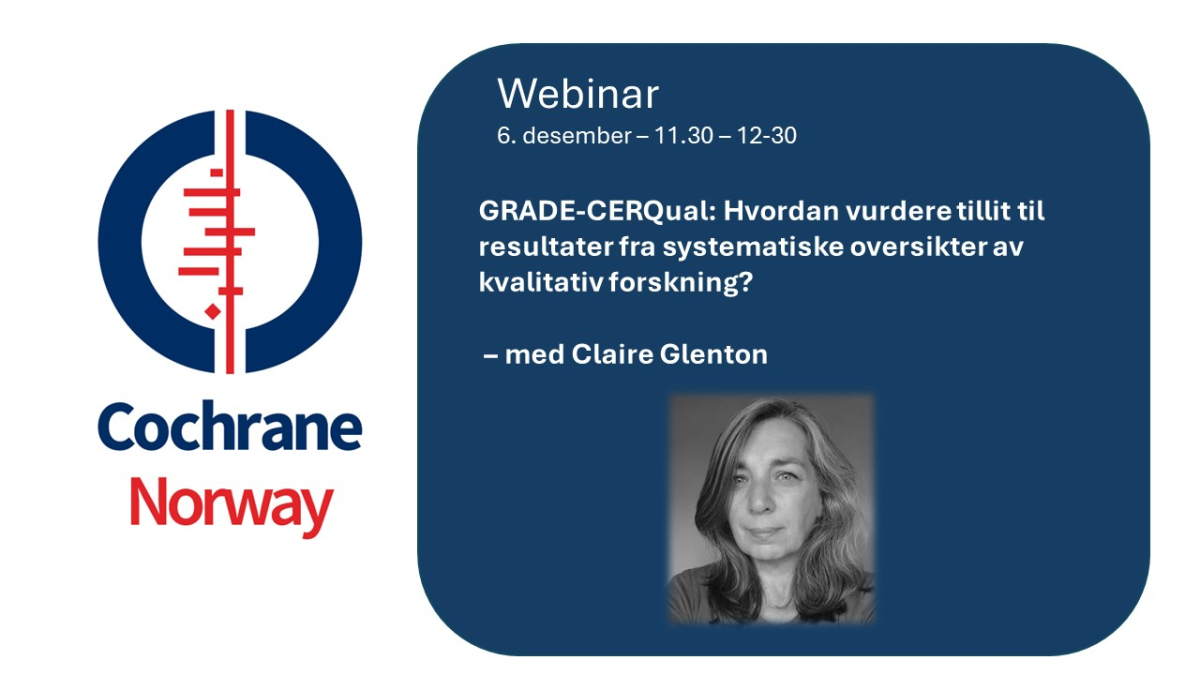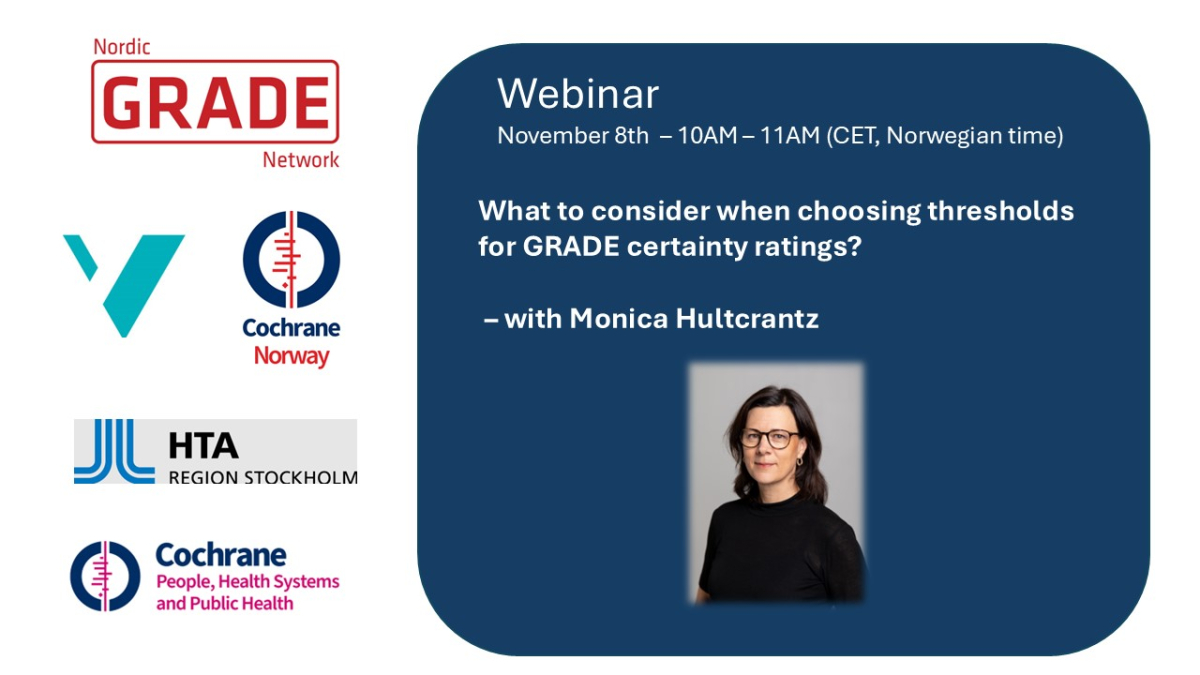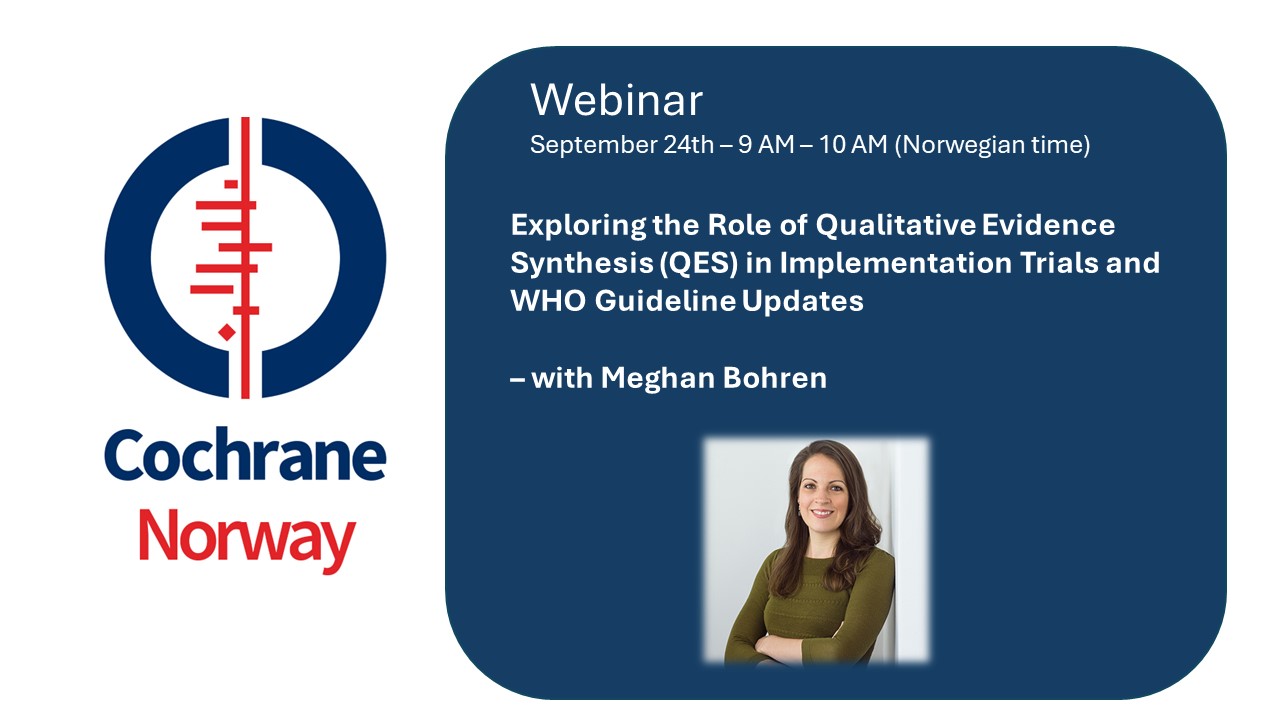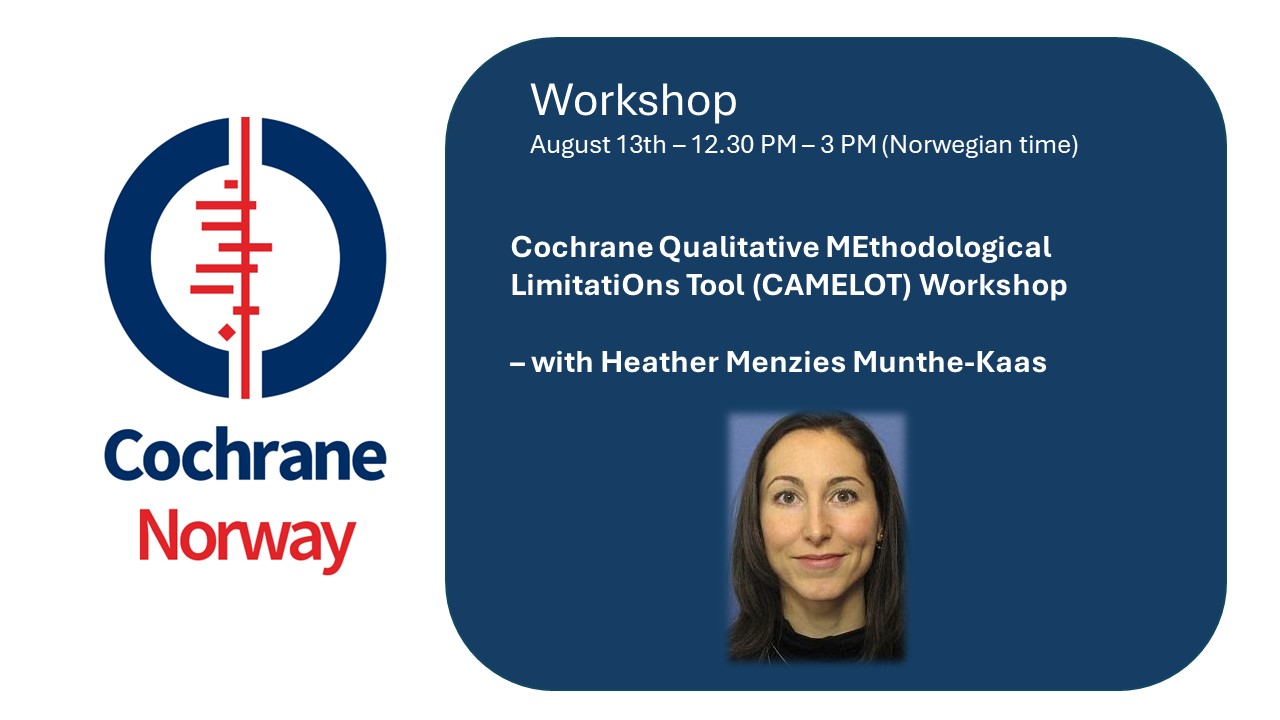Webinar: From Theory to Practice: Getting Started with Scoping Reviews
March 3rd. 11 AM - 12 PM (CET, Norwegian time)
Language: English
Where: Zoom
Link to registration: https://hvl.zoom.us/webinar/register/WN_jiKLcFc5RZ2H0meYsfSlyg

Overview:
This webinar is designed to demystify the basics of Scoping Reviews. Perfect for those new to this research methodology, you will learn the fundamental steps though practice examples and leave with a roadmap for starting your own review.
What you'll learn:
• The basics: What makes scoping reviews different from other types of reviews
• How to develop your research question and search strategy
• Tools to organise your review process
• Introduction to PRISMA-ScR guidelines
Audience:
This webinar is ideal for students, early career researcher and academics looking to understand the basics of Scoping Reviews in a time-efficient way.
Webinar: GRADE-CERQual: Hvordan vurdere tillit til resultater fra systematiske oversikter av kvalitativ forskning?
This webinar will be conducted in Norwegian. Therefore, all information about the webinar is provided in Norwegian.
6. desember - 11.30 - 12.30
Språk: Norsk
Hvor: Zoom - https://hvl.zoom.us/j/67183768085?pwd=OHRMOFFiQUpEKzQ0RFE1NUtUOGoydz09

Interessen for å syntetisere kvalitativ forskning i systematiske oversikter har vokst enormt de siste årene. Slike oversikter er en viktig kilde til informasjon om verdiene og erfaringene til for eksempel brukere og utøvere av helse- og velferdstjenester og kan være en viktig støtte til beslutningstagere.
Med økt bruk av kvalitativ forskning i beslutninger, følger også et behov for å vurdere tilliten til denne forskningen. GRADE-CERQual er et system for å vurdere og beskrive hvor mye tillit en kan ha til funn fra kvalitative forskningsoversikter (www.cerqual.org). GRADE-CERQual
Recording of the webinar:
Webinar: What to consider when choosing thresholds for GRADE certainty ratings?
November 8th, 10 AM - 11 AM (CET, Norwegian time)
Language: English

In a key paper from 2017, GRADE defined the certainty of evidence as the certainty that the true effect lies on one side of a threshold or in a particular range. This definition has proved useful as the basis for rating certainty. However, in the initial and subsequent GRADE papers, the categorization of suggested thresholds and ranges as levels of contextualization has proved confusing for some GRADE users. In newly endorsed GRADE guidance a solution is presented – and different considerations that can be made when choosing thresholds are described.
At this webinar the new guidance will be presented together with a background on the topic. We aim for an informal and interactive webinar with a focus on discussing questions and thoughts from participants and implications for work in the Nordic countries.
Recording from the webinar:
Webinar: Exploring the Role of Qualitative Evidence Synthesis (QES) in Implementation Trials and WHO Guideline Updates
September 24th - 9 AM - 10 AM (Norwegian time)
Language: English
Where: Zoom

We are thrilled to announce an upcoming webinar hosted by Cochrane Norway! Join us as we delve into using a Qualitative Evidence Synthesis (QES) to inform an implementation trial and WHO guideline update, a topic that is not only timely but also crucial in our field. Associate Professor Meghan Bohren, the head of the Gender and Women’s Health Unit, Nossal Institute for Global Health, University of Melbourne, and Co-Director of the World Health Organization Collaborating Centre for Women’s Health, will be our esteemed speaker. She leads primary mixed-methods, implementation research and systematic reviews related to improving women’s experiences with pregnancy and childbirth care, and works primarily with groups who are disadvantaged by systems of power. She has a particular interest in using innovative qualitative research methods to bring community and health worker voices to public health and clinical guideline development. She will present how the QES informed the development of the E-MOTIVE trial (which demonstrated a 60% reduction in Postpartum Hemorrhage (PPH)), and triggered an immediate rapid update of the WHO guideline (within 6 months from trial results to guideline publication).
Recording:
Recommended reading: Development and Piloting of Implementation Strategies to Support Delivery of a Clinical Intervention for Postpartum Hemorrhage in Four sub-Saharan Africa Countries
Cochrane Qualitative MEthodological LimitatiOns Tool (CAMELOT) Workshop
August 13th - 12.30 PM - 3 PM (CET)
Language: English
Where: Western Norway University of Applied Sciences, inndalsveien 28, 5063 Bergen. Room M130/131
Please note that this is a physical meeting—there will be no option to participate digitally.

In this workshop we will introduce the Cochrane Qualitative MEthodological LimitatiOns Tool (CAMELOT). We will discuss how it was developed, introduce the CAMELOT domains and go through a worked example of applying CAMELOT. Participants will then have the opportunity to work in small groups and practice applying CAMELOT to a primary study. We will then discuss any questions or challenges that arise when applying CAMELOT.
Heather Menzies Munthe-Kaas, Dr.Philos, is a researcher at Centre for Epidemic Interventions Research at the Norwegian Institute of Public Health. She is co-founder of the GRADE-CERQual approach and the TRANSFER approach. She has been conducting systematic reviews of effectiveness and qualitative evidence syntheses for more than ten years. Her research interests focus on using human-centred design approaches to develop methods and tools to improve the usefulness, relevance and usability of systematic review findings. She also works with the development and evaluation of resources to teach critical health literacy as a means of supporting informed health decisions.
Preparing a Scoping Review within a Masters Degree Programme: Advantages, Disadvantages and Personal Insights

In this webinar we will delve into conducting a scoping review within the context of a master's programme assessment. Our webinar aims to unravel the intricacies of the Scoping Review methodology and methods, shedding light on the advantages and potential challenges based on real-world experiences. Join us to gain some insights of how reviews can play a pivotal role in shaping the assessment landscape of master programmes.
This is a hybrid event organized by Cochrane Norway and the Evidence-Based Practice section in collaboration with the Evidence-Based Research Network (EBR) and Cochrane People, Health Systems, and Public Health.
Missing Nordic Trials: how can we avoid research waste, and meet ethical standards?
Language: English
A total of 475 clinical studies completed in Norway, Denmark, Iceland, Finland, and Sweden between 2016 and 2019 have never published their results in any form. A total of 83,903 people participated in these studies, according to public records. The report, prepared by an international group of 39 researchers, was released on February 6, 2024. It showed that across all five countries, 22% of all clinical study results were never published. There are large differences in reporting performance between institutions. Read the report here: https://lnkd.in/d_6Eib58.
On March 15 at 10 AM, Cochrane Norway, the Cochrane People, Health Systems, and Public Health Thematic Group, Cochrane Sweden, Cochrane Denmark, Evidence-Based Research Network, and the Section of Evidence-Based Practice in Health Care at Western Norway University of Applied Sciences invited you to a webinar about the report. The report was presented by co-author Jan-Ole Hesselberg from the Dam Foundation.
